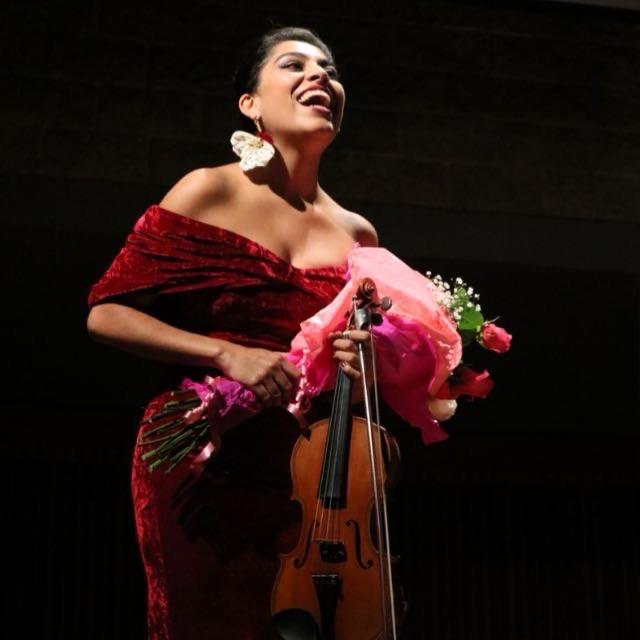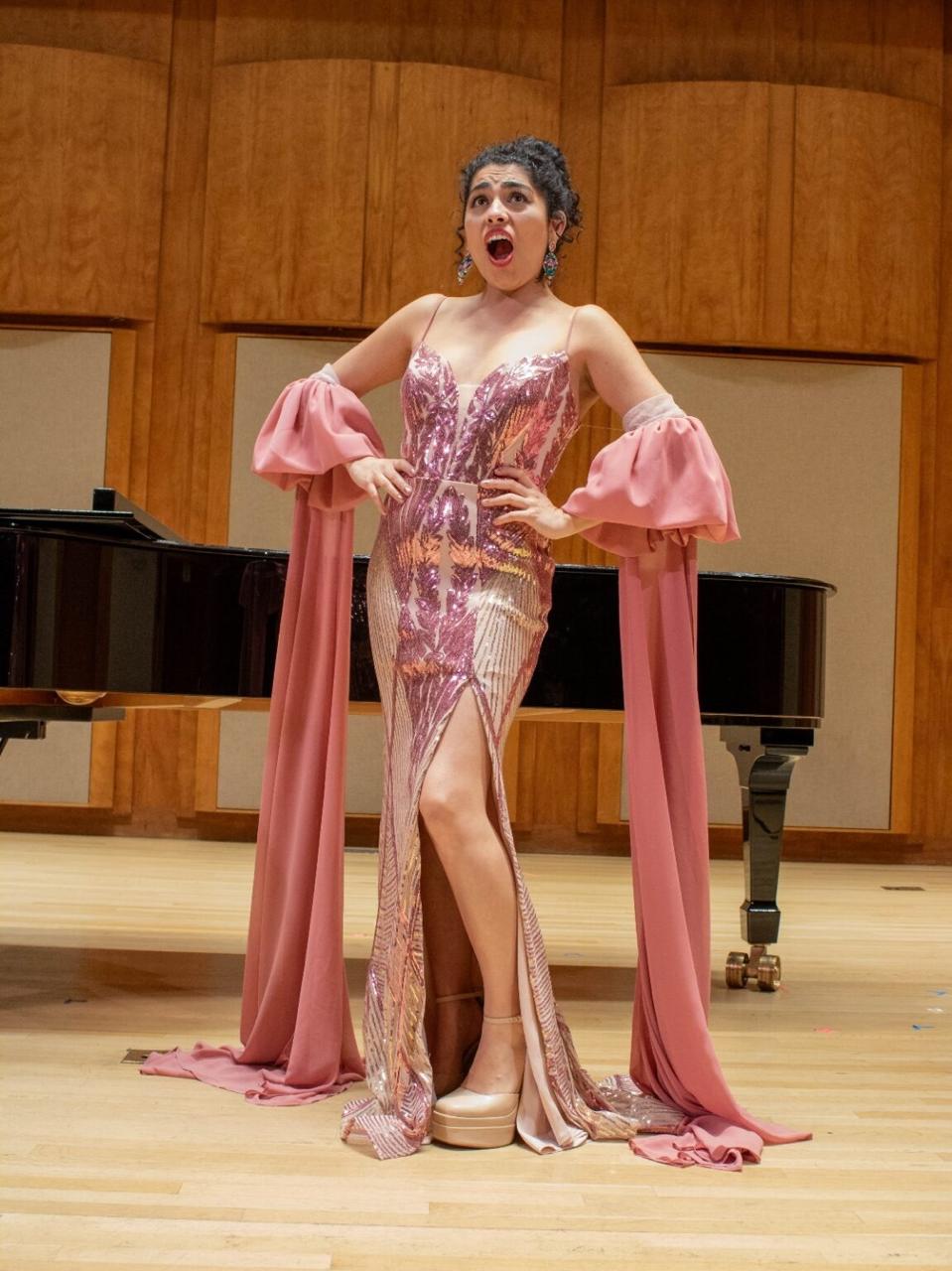The journey of Mónica López: the Colombian soprano who discovered through opera how to help displaced Afghans

An orchestra, the Afghanistan Freeharmonic Orchestra, which offers hope to musicians who have fled their countries due to persecution, mostly from Afghanistan, will perform in the United States this month, and one of the artists participating in the initiative is Colombian.
Mónica López, although she did not flee the conflict as many of the peasants in her country have done , has dedicated herself to traveling the world as an opera soprano and supporting causes that are worthwhile to her.
“Many of my colleagues are in asylum, have lost their instruments, and their voices have been silenced. This concert will be special: composer Cudrat Wacefi—a great friend and founder of the orchestra—is writing a piece for the occasion,” shares López, who was moved by the story of the musician who was raised in an orphanage in Afghanistan because his family didn't have the means to care for all his siblings , and there he found an escape in the trumpet.
When the Taliban took power in 2019, he was forced into exile. Musicians began to be persecuted and tortured. He managed to escape thanks to international contacts working on educational projects. Today he lives in Boston with a family who took him in, studies thanks to donations, and is seeking asylum.
“Her story is incredibly difficult, but what impacts me most is her capacity for gratitude. She doesn't hold grudges; on the contrary, she has an immense desire to serve, to share her culture. She tells me, for example, that her sister—who is still in Afghanistan—refuses to remain silent . She marches, protests, wants to study. And that has them very worried. But her courage is moving,” López says.

Monica Lopez Photo: Courtesy
Anecdotes like this nourish the young violinist's spirit, allowing her to take to the stage, lovingly imbue her notes, and replicate the universal language of music, with which she will soon travel to Madrid and Berlin, performing works by Claudio Monteverdi and Richard Strauss. Furthermore, thanks to stories like Wacefi's, she has actively worked to promote artists' rights, supporting programs that seek to highlight Afghan artists, especially women, who have suffered a cultural ban.
López also plays a key administrative role at the Afghanistan Freeharmonic Orchestra, where she acts as a facilitator and organizer of social media campaigns . She served as conductor in 2023 and now serves on the board of directors of the Alte Münze orchestra, where she plays soprano and violin.
The artist's musical history began in her native Bogotá, amid church choirs, at Christmas recitals, and in her bedroom, practicing the violin for hours.
“The performance I remember most was in Plaza de Bolívar, singing with a choir when I was about five years old. I was tiny, wearing a red beret, and running around bothering people with my skirt. I've always been a Christian, so that's where singing began. At eight years old, my interest in the violin arose, thanks to a pastor friend who told my dad: 'She has that musical spark, you should enroll her in the symphony orchestra.' That's how I started playing the violin after attending educational concerts and falling in love with the instrument,” recalls the 33-year-old soprano.
At first, he was inclined to pursue a career in finance and international relations at Externado University. But those moments of hanging out with his classmates and eventually pulling out his violin on the playground finally made him realize that high notes and strings were his calling.
“My parents supported me, and so I entered Los Andes. In my third semester, I only wanted to take vocal technique classes. They told me, 'You can do a double major (violin and singing) if you want.' I thought it meant getting into two very demanding instrumental programs. By majoring in violin, I had to dedicate at least eight hours a day. So I thought, 'What time do I study singing, orchestra, and everything else?' But they told me, 'You have a good GPA, we'll accept you,'” López says.
When she began studying singing, another door opened: opera. In group classes, the teachers assigned her homework to research this art form, and she fell in love with the performances, the elegant costumes, the dramatic depth, and the singers' powerful voices. " I was fascinated by the convergence of all the arts in this show ," the soprano says.
And she adds that some opportunities arose in Colombia thanks to the youth groups of the Bogotá Philharmonic. “I was in the Philharmonic Choir for four years. While I was in college, I auditioned and was selected as a soprano. There I was able to be a soloist in several versions of Opera al Parque. I also worked at events—weddings, toasts—where I played the violin and sang. People really liked it,” says López.
Eager to reach new heights, the young woman from Bogotá participated in a master's program in Boston, United States. She graduated and has been in the United States ever since, performing opera and zarzuela, and constantly preparing for new challenges with the academy.
Well, for the artist, studying is very important, especially in the classical world. “The foundations are everything. Classical musicians, like jazz musicians, need solid foundations, both technically—to take care of the instrument, in my case, the voice—and musically: the historical context, harmony, counterpoint. Knowing, for example, why a note fits in one place and not another. How to tune according to harmony... there's a lot of technical and theoretical knowledge that, if you don't study it, you simply won't achieve,” concludes the singer, who sees this as an athletics competition: an athlete can't win if they don't go out every day to run, stretch, take care of their diet, and rest. In the same way, a classical musician who doesn't study, who doesn't prepare, simply won't go far.
Preparation has become the key to success for Mónica López, especially in a world where artists with the same kind of talent abound. “ Almost all of us women in opera singing are sopranos, so many of us are going for the same role. It's very difficult to stand out. And there's also the challenge of learning to accept a 'no,' often. Just recently, I read about the rejections faced by great singers like Montserrat Caballé, Enrico Caruso, and Renée Fleming. Caruso, for example, was still being told no at 25, 28, and even 35. And he ended up being one of the greatest in history. That gives me strength: knowing that this path is so hard, even for the best,” she reflects.
In addition to hard work, leaving the field of music, studying German, French, and English to perfect her work in other languages, and entering other industries, López has found in her work two important factors that have brought her to the international opera scene.
One of those elements is God. As a Christian, she has seen the almighty in each of her works since she was a child . Therefore, before stepping on stage, she says, "I think, I breathe, and I pray," and adds: "I also connect from another place: I sing first for myself, and then for others. Because if you don't consider yourself the first person you should love, it's difficult to connect with others."

Monica Lopez Photo: Courtesy
Mónica is currently working on an album of Christian hymns in Spanish and English, blending lyrical singing techniques as a soprano and violinist, accompanied by a pianist. "This album, titled A Message of Hope, seeks to be an oasis of inspiration amidst life's difficulties and is a unique work of its kind. I always proudly carry the name of my country, Colombia, and my roots are reflected in every note and feeling I express, always remembering what it means to 'make a country,'" she confesses.
María Jimena Delgado Díaz
eltiempo





%3Aformat(jpg)%3Aquality(99)%3Awatermark(f.elconfidencial.com%2Ffile%2Fbae%2Feea%2Ffde%2Fbaeeeafde1b3229287b0c008f7602058.png%2C0%2C275%2C1)%2Ff.elconfidencial.com%2Foriginal%2Fbcc%2F857%2F40b%2Fbcc85740b37262db6c69cf837149a7dd.jpg&w=1280&q=100)